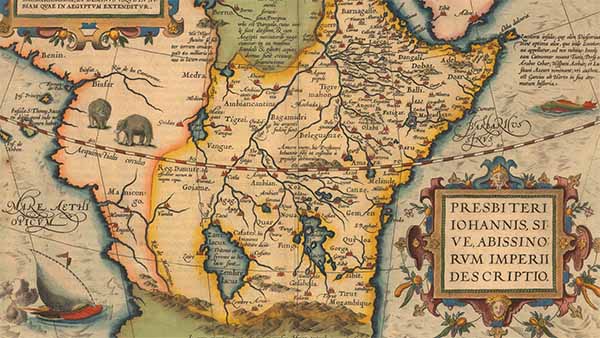The Legendary Kingdom of Prester John

The military situation in Palestine was more than delicate for Christians at the end of the first half of the 12th century. It was then that the incredible news reached them that a great king of Asia had come to their aid.
An unexpected savior for the Crusaders
When the existence of a great Christian kingdom was first mentioned in 1145, the Crusader-held Kingdom of Jerusalem faltered under the blows of Muslim armies. On Christmas Day 1144, the Fortress of Edessa fell to the enemy and the future looked bleak.
It was then that the news arrived that a powerful warlord crushed the Muslim army of the Sultan of Persia, near Samarkand, in a formidable battle, on September 8 and 9, 1141. It is claimed that the victor is a Christian sovereign, although schismatic, "Nestorian": he bears the name of Johannes Presbyter, later francized as Prester John.
But the saving army is slow to arrive. Rumors circulate among the Crusaders to justify this delay: they allow them to keep hope, while the situation of the Kingdom of Jerusalem worsens. After his victory over the sultan, it is said, Prester John wanted to come to the aid of the crusaders; but he could not cross the Tigris, he had to return to his enigmatic Kingdom of Asia ...
We know today that the victor over the Muslims in Sarmakand is the leader of a Turkish tribe in Asia, indeed perhaps Christianized, the Kara Khitai. His name was Gurkhan and he died in 1143 or 1144, that is, before we even speak of Prester John for the first time.
The mythical Kingdom of the "three Indies"
In 1165, Manuel I, the ruler of Byzantium, received a strange letter allegedly sent by the famous John and describing the wonders of his Kingdom of the "three Indies", a kind of Eastern Eldorado. This text, the origin of which is nevertheless highly suspect, maintained the myth in Europe until the Renaissance. The Germanic Emperor Frederick Barbarossa does not seem to believe in the authenticity of the document and does nothing to make contact with the distant Christian king. Pope Alexander III is also slow to react. However, in 1177, he had a response written to the "famous and magnificent King of the Indians, the Most Holy Priest", and entrusted it to his personal doctor, a certain Philippe. Unfortunately, no one hears of the emissary after his departure for the East, and when Sultan Saladin captured Jerusalem in 1187, no Christian army from Asia intervened to save the holy city. One could believe at the end of the myth.
Genghis Khan confused with Prester John
But this is without counting the mystical fervor that Christians feel towards Prester John, fervor maintained by the desire to conquer the infidels and the image of an Asian kingdom overflowing with riches. So, when Christendom learned, in 1221, of the victory of a great army from the east over the Muslims, in Samarkand again, one believed to recognize the action of the legendary king. Terrible mistake, because the one we take once again for the Prester John, or one of his successors, crushes shortly after the Christian kingdom of Georgia, then devastates Eastern Europe until 1241. This man is no other than Genghis Khan, the leader of the Mongol invasion from the other end of Asia ...
A localization error?
Once peace was established with the Mongols, many European travelers, including the famous Marco Polo, unsuccessfully sought the Kingdom of Prester John in Central Asia. But more is needed to discourage them. From the beginning of the 14th century, it is believed that there may have been a mistake on the continent and that we must turn to Africa, where the Kingdom of Abyssinia (Ethiopia) is located, aptly nicknamed “African India”. The Prester John is then identified with the Negus of Ethiopia and the Christians form the plan to go and ask him for help to attack the Sultan of Egypt. The chosen route must bypass the Muslim Empire: the only possible route is therefore around Africa from the south. The circumnavigation of the African continent was carried out by the Portuguese, who indeed reached Ethiopia in 1493. Thus, the opening of this new sea route owes a lot to the legend of the Prester John. But the Portuguese soon realize that the negus is unable to provide them with the help they hoped for and it is they who, ultimately, must help him resist Muslim pressure in the north of his kingdom. During the Renaissance, a legend thus disappeared on which generations of Christians had founded many hopes.









































































































































































































































































































































